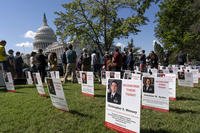The COVID-19 pandemic has put on hold the Defense Health Agency's effort to reboot its ambitious reform of the military health system, even as it prepares for the complicated distribution and administration of novel coronavirus vaccines -- once they are approved.
"Some outpatient physicians' offices have either downsized or closed themselves," putting in doubt the agency's goal of sending about 190,000 Tricare beneficiaries into the private sector to seek care, said Army Lt. Gen. Ronald Place, the DHA director.
Read Next: Why the USS Cole's Commander Pushed to Keep His Crew Together After Deadly Bombing
"[In addition], some hospitals across America have either downsized or closed," Place said in an Oct. 8 call with reporters organized by the Defense Writers Group. "[Data the DHA had gathered] to make recommendations to the [Defense Department] about where the capability may exist in the civilian community to effectively provide access to safe, high-quality care for some of these beneficiaries -- that information may no longer be true."
As a result, the DHA has also put on hold a plan to cut as many as 18,000 medical billets from the military health system, Place said, adding that he doesn't expect to make recommendations to the DoD on either plan until at least early 2021.
Instead, the intention is to reassess what is available in the private sector, "bring all that information back to the secretary of defense" and "help determine a way forward," he said.
Place also spoke to the challenges the DHA will face once COVID-19 vaccines are approved by the Food and Drug Administration and the DoD learns where the military stands in the priority for getting access.
The FDA currently has six vaccine candidates from different companies in the final trial stages.
Last month, the National Academies of Sciences, Engineering and Medicine issued a draft plan suggesting that health care workers and first responders would get priority when vaccines become available.
Place said vaccines under consideration by the FDA offer particular challenges. As opposed to the single-shot flu immunization, the coronavirus vaccines may require two doses.
"We have to be able to figure out not just how we transport, how do we hold it, how we inject it, but how does it fit in the system with six different makers?" Place said, noting that some of the vaccine candidates will require freezing at extreme temperatures. "If you get one [shot], how do we make sure that the second dose that you get is from the same maker?"
Once the shots are administered, "we would then have to manage and track each of our beneficiaries," he added.
The DoD has a requirement to monitor recipients of vaccines for up to two years after the shots are administered, he said.
-- Richard Sisk can be reached at Richard.Sisk@Military.com.
Related: Military Brass with COVID-19 Could Get Same Treatments Trump Received, General Says















